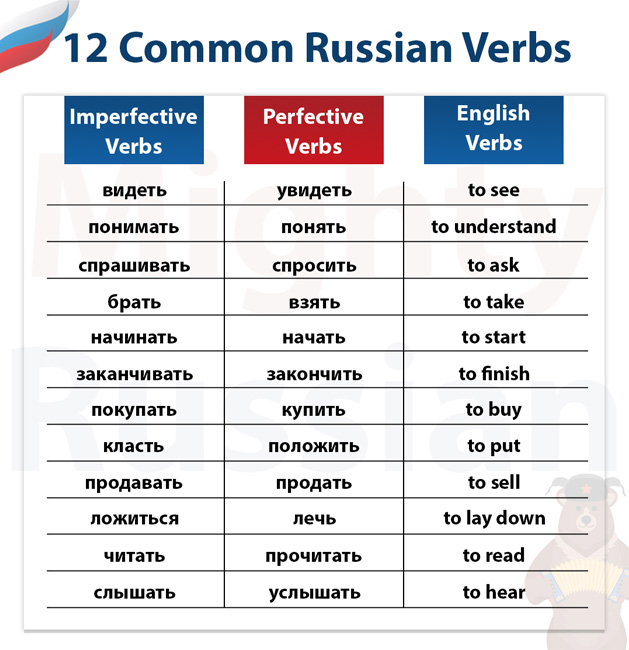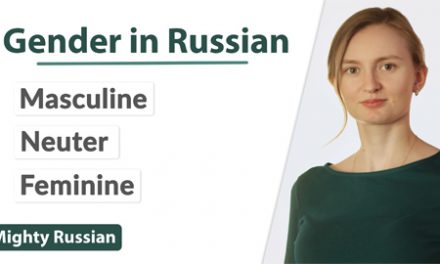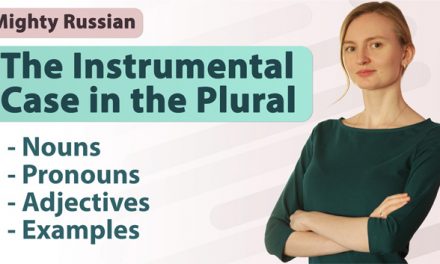It seems that you are looking at an outdated version of this lesson.
Click here to see the latest version of it, which includes examples with audio, integration with our dictionary and exercises.
Verb Aspects in Russian
Verb aspects are very important in Russian.
They indicate whether an action is complete, frequent or in progress.
Without understanding how to use verb aspects correctly, it will be very difficult for you to make or understand Russian sentences.
Almost every Russian verb has two aspects, an Imperfective and a Perfective.
For example:
The verb “learn” can be translated into Russian as “учить” and “выучить”: the imperfective and perfective form of the same verb.
The same goes for the verb “eat”, which can be translated as “есть” and “поесть”.
In this lesson, you will learn:
1) The main uses of Imperfective Verbs;
2) The main uses of Perfective Verbs;
3) How to identify Perfective and Imperfective Verbs.
If there is any specific part of the lesson you would like to study first, you can go straight to that subject by clicking on the above titles in blue.
Imperfective Verbs in Russian
Imperfective verbs in Russian can be used in all the three tenses: present, past and future.
There are 3 main situations in which we use them.
01) Repeated or habitual actions
Whenever an action happens repeatedly, periodically or is part of someone’s routine, you will use an imperfective verb. For example:
Present:
Я работаю в офисе (I work in an office)
Я хожу в спортзал каждый день (I go to the gym every day)
Past:
Он учился в университете (He studied at university)
Раньше я играл в футбол (I used to play soccer)
Future:
Я буду учиться в университете в следующем году (I will study at university next year)
Я буду работать больше в следующем месяце (I will work more next month)
If you don’t know yet how to use these verb tenses in Russian, you can start by checking out our complete lesson about the Past Tense clicking here.
Soon we will add lessons about the other tenses.
02) Continuous actions or actions in progress
Whenever an action is in progress or is not completed, you will use imperfective verbs. For example:
Present:
Маша разговаривает по телефону (Masha is talking on the phone)
Она готовит ужин (She is cooking dinner)
Past:
Мы смотрели фильм (We were watching a movie)
Сегодня утром я играл в игры (I was playing games this morning)
Future:
Завтра я буду заниматься целый день (Tomorrow I will be studying the whole day)
Я буду работать все выходные (I will be working during the whole weekend)
03) Life experiences
When you want to talk about an experience someone’s had in their life, you will also use imperfective verbs.
These sentences will always be in the past.
For example:
Я пробовал китайскую еду (I have tried Chinese food)
Я видел президента (I have seen the president)
Perfective Verbs in Russian
Perfective verbs are mainly used to indicate completed actions with emphasis on result.
You will use perfective verbs when you want to emphasize that an action was or will be completed.
Here, the focus is not on the fact that the action was or will be executed for some time or periodically. For example:
Past:
Я прочитал книгу (I read the book)
This sentence means that I read the book completely. I read it up to the end.
Маша помыла посуду (Masha washed the dishes)
She has finished washing the dishes. The result is that the dishes are clean.
Future:
Я испеку торт (I will bake a cake)
This sentence emphasizes the fact that the cake will be ready.
Завтра я напишу сочинение (I will write an essay tomorrow)
This sentence means that I will write a whole essay tomorrow. I will start and finish writing it.
Note that when we make a sentence with a perfective verb, we don’t need a separate word to indicate the future, such as “буду / will”. The perfective verb itself already implies that the action will take place in the future.
That’s because perfective verbs cannot be used in the present.
According to the logic of the Russian language, a result can be achieved either in the past or in the future.
As you can see, in English, there isn’t any concept equivalent to the aspect in Russian.
That’s why it’s important that you understand the logic of the Russian language and know when to use each type of verb.
Now, let’s take a look at some patterns that will help you tell whether a verb is perfective or imperfective.
How to identify Perfective and Imperfective Verbs
There isn’t a universal way to tell whether a verb is perfective or imperfective.
In fact, some verbs are even irregular and have completely different roots.
For example, the verbs “говорить” and “сказать”, which are the imperfective and perfective forms of the verb “say” respectively.
Luckily, many verbs have prefixes or endings that will help you guess their aspect.
Normally, you will be able to identify a perfective verb by the presence of a prefix.
The most common perfective prefixes are:
По:
поговорить (speak)
посмотреть (watch, look)
помыть (wash)
положить (put)
подарить (give as a gift)
полюбить (love)
С:
сделать (do, make)
спеть (sing)
сварить (boil, cook)
спрятать (hide)
На:
написать (write)
напечатать (type)
нарисовать (draw)
Imperfective verbs, on the other hand, can be usually identified by their endings.
The most common imperfective endings are:
ывать:
рассказывать (tell)
показывать (show)
опаздывать (be late)
выбрасывать (throw away)
открывать (open)
ивать:
спрашивать (ask)
разговаривать (talk)
заслуживать (deserve)
Another interesting pattern can be identified in imperfective verbs that end in “АТЬ” or “ЯТЬ”. In their perfective form, they have the letter “И” instead of “А” or “Я”.
For example:
решать – решить (solve)
получать – получить (receive)
повторять – повторить (repeat)
объяснять – объяснить (explain)
Of course these patterns won’t help you identify the aspect of every single Russian verb, but as you study, you will notice that they are very common.
Here is a table with 12 very common Russian verbs in their perfective and imperfective form.
You can take a screenshot and even print out this table so you can use it whenever you are studying.
And that’s it for this lesson. Now you know exactly how the concept of aspect works in Russian.
I hope everything got clear but if you have any questions, just leave them in the comment section below.
I will be very happy to help you!














The verb pair “ложиться/лечь” is mistranslated. The correct translation is “to lie down” (to take a horizontal position, e.g. to lie down on a bed.) “лежать” means “to be lying” (to be in a horizontal position). “To lay (something) down” (put in a horizontal position) is “класть /положить.”
The two verbs in English are “to lie” and “to lay.” The 3 forms of “to lie,” the intransitive verb, are “lie/lay/lain” with the present participle “lying.” The 3 forms of “to lay” (the transitive verb) are “lay/laid/laid” with the present participle “laying.” Because the forms of the 2 verbs are so similar, it is very easy to confuse them. Even most native speakers of English don’t use the different verb forms properly.